The AMD Ryzen Threadripper 3960X and 3970X Review: 24 and 32 Cores on 7nm
by Dr. Ian Cutress, Andrei Frumusanu & Gavin Bonshor on November 25, 2019 9:05 AM ESTCPU Performance: Encoding Tests
With the rise of streaming, vlogs, and video content as a whole, encoding and transcoding tests are becoming ever more important. Not only are more home users and gamers needing to convert video files into something more manageable, for streaming or archival purposes, but the servers that manage the output also manage around data and log files with compression and decompression. Our encoding tasks are focused around these important scenarios, with input from the community for the best implementation of real-world testing.
All of our benchmark results can also be found in our benchmark engine, Bench.
Handbrake 1.1.0: Streaming and Archival Video Transcoding
A popular open source tool, Handbrake is the anything-to-anything video conversion software that a number of people use as a reference point. The danger is always on version numbers and optimization, for example the latest versions of the software can take advantage of AVX-512 and OpenCL to accelerate certain types of transcoding and algorithms. The version we use here is a pure CPU play, with common transcoding variations.
We have split Handbrake up into several tests, using a Logitech C920 1080p60 native webcam recording (essentially a streamer recording), and convert them into two types of streaming formats and one for archival. The output settings used are:
- 720p60 at 6000 kbps constant bit rate, fast setting, high profile
- 1080p60 at 3500 kbps constant bit rate, faster setting, main profile
- 1080p60 HEVC at 3500 kbps variable bit rate, fast setting, main profile
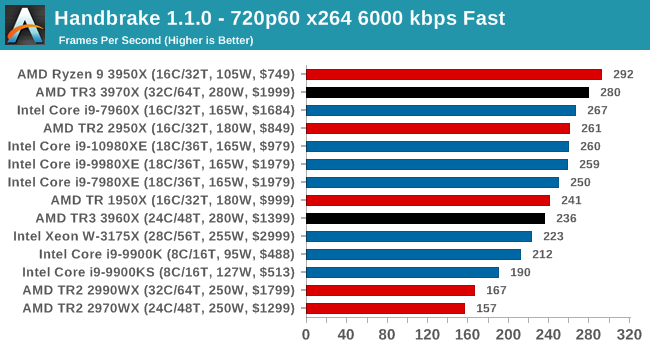
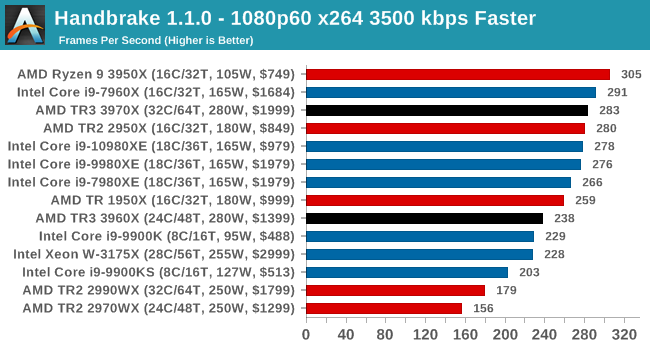
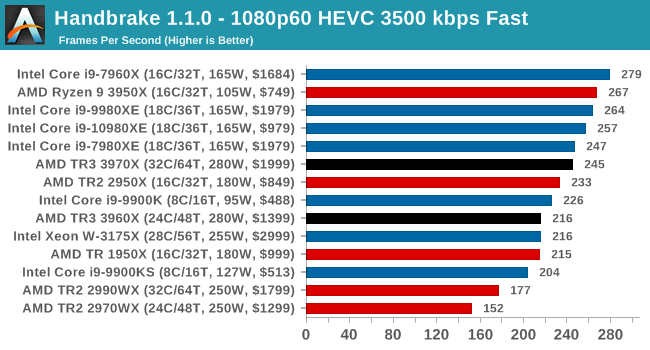
Video encoding is a little varied, based on the variable threaded nature. Certain encoding tests can be more memory sensitive here, or accelerated in different ways, or not scale well with more cores. Either way, TR3 performs a lot better than TR2, but the 3950X seems the best choice.
7-zip v1805: Popular Open-Source Encoding Engine
Out of our compression/decompression tool tests, 7-zip is the most requested and comes with a built-in benchmark. For our test suite, we’ve pulled the latest version of the software and we run the benchmark from the command line, reporting the compression, decompression, and a combined score.
It is noted in this benchmark that the latest multi-die processors have very bi-modal performance between compression and decompression, performing well in one and badly in the other. There are also discussions around how the Windows Scheduler is implementing every thread. As we get more results, it will be interesting to see how this plays out.
Please note, if you plan to share out the Compression graph, please include the Decompression one. Otherwise you’re only presenting half a picture.
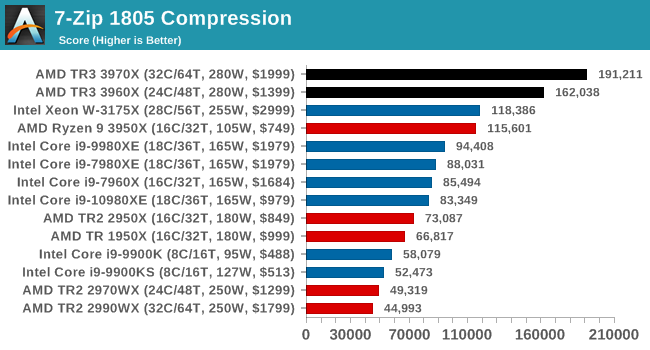
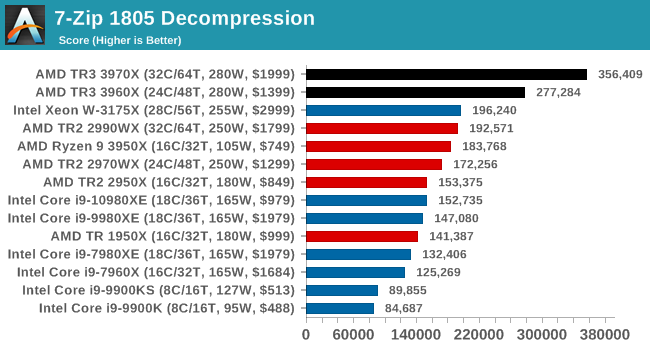
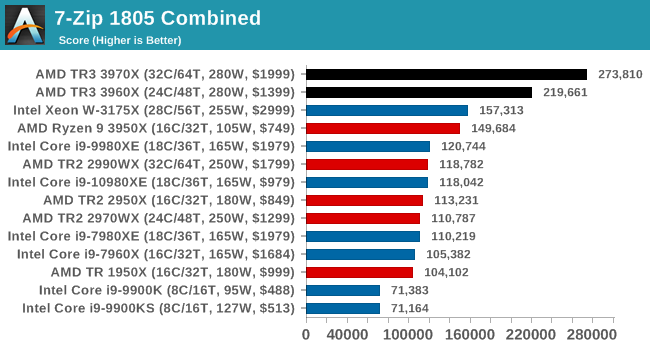
Easily parallel puts the TR3 well ahead of TR2 and Intel.
WinRAR 5.60b3: Archiving Tool
My compression tool of choice is often WinRAR, having been one of the first tools a number of my generation used over two decades ago. The interface has not changed much, although the integration with Windows right click commands is always a plus. It has no in-built test, so we run a compression over a set directory containing over thirty 60-second video files and 2000 small web-based files at a normal compression rate.
WinRAR is variable threaded but also susceptible to caching, so in our test we run it 10 times and take the average of the last five, leaving the test purely for raw CPU compute performance.
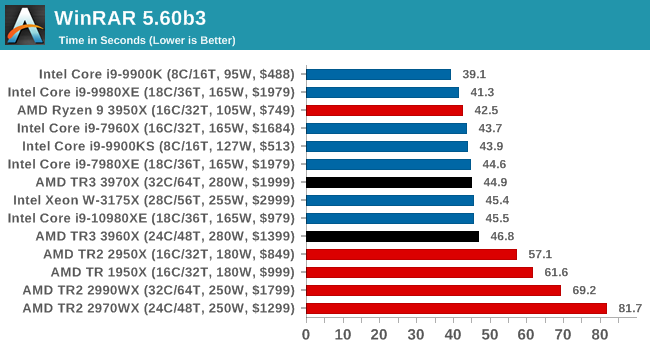
WinRAR is a variably threaded application, and both TR3 processors perform in the same ballpark as anything from Intel. Ideally we should have seen them streak ahead, but we seem to be at a point where CPU frequency or core counts are the limiting factor. At least with Zen 2, there are no issues as there was with Zen 1/Zen+.
AES Encryption: File Security
A number of platforms, particularly mobile devices, are now offering encryption by default with file systems in order to protect the contents. Windows based devices have these options as well, often applied by BitLocker or third-party software. In our AES encryption test, we used the discontinued TrueCrypt for its built-in benchmark, which tests several encryption algorithms directly in memory.
The data we take for this test is the combined AES encrypt/decrypt performance, measured in gigabytes per second. The software does use AES commands for processors that offer hardware selection, however not AVX-512.
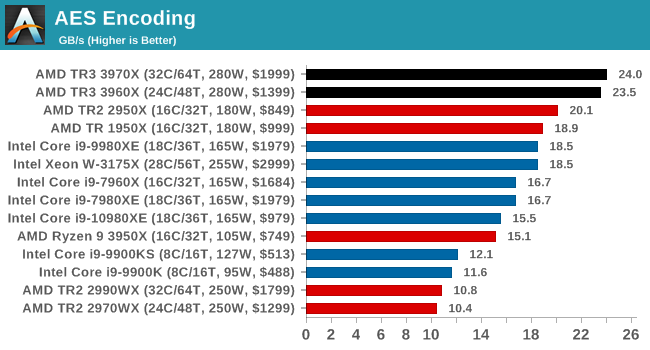










245 Comments
View All Comments
Dizoja86 - Thursday, November 28, 2019 - link
"Intel is going to have to have a shift its design strategy to compete."im.thatoneguy - Tuesday, December 3, 2019 - link
Any temperature stats? You recommend a good water cooler so it would be helpful to know how the thermaltake ring did under load.cdb000 - Sunday, January 26, 2020 - link
Seconded!In fact, a good write-up on how to cool a 280W CPU that is continuously running flat out.
My (old, slow) 1950X is cooled by a 280mm AIO and gets to ~61C when run flat out. These new Threadrippers use 55% more power which suggests that a 420mm or 480mm radiator will be required.
pvrvideoman - Thursday, December 5, 2019 - link
Great for AMD! Popular YouTube tech reviewers and others really need to stop saying that AMD has "crushed" Intel. That is just stupid. What they have done is deliver a very powerful, competitively priced product that delivers mostly the same or better performance at different price points. The desktop market is small. It's not making AMD or Intel all that much money. But it is great when companies like Amazon and Google talk about moving forward or transitioning to AMD Epyc line of processors. The enterprise and High Performance Computing contracts are where the real victory lies.tamalero - Tuesday, December 24, 2019 - link
holy intel apologist batman..alpha754293 - Monday, December 16, 2019 - link
When are the results from the benchmarking for the AMD Threadripper 3970X going to be on the benchmarking database?I tried looking for it just now and couldn't find it listed when I wanted to compare that and the AMD Ryzen 3950X.
Thanks.
lxxxxl - Thursday, December 19, 2019 - link
Is Chromium compilation still on the list of tests?And these new Threadrippers are not in Bench database?
soultorntech - Monday, December 23, 2019 - link
People concerned about the price between AMD and Intel HEDT processors need to calculate the per core cost and they will find out that the cost between the HEDT processors are pretty close. Add in the fact that Threadripper has a lot more L3 cache than the 10980XE plus can utilize up to 4 times as much RAM then the price of Threadripper 3 processors are a little easier to justify.stefanbatros - Sunday, December 29, 2019 - link
Hi everyone,I bought a 3970x + a Gigabyte Designare mobo. These will be used in a 4GPU setup for rendering and physics simulations.
Right now I have to chose between these 2 Ram kits, which are available and at a decent price in my country:
1. Corsair VENGEANCE® 128GB 3000MHz C16 -750$
2. G.Skill TridentZ 3000MHz C14 - 981$
Do you guys think that the C14 Gskill justifies the 200$ dollar difference? Will it be great improvement over the C16?
I am leaning toward the Vengence more because of price +is in stock in store + it is low profile and it will fit better with the Noctua nh-u14s tr4-sp3.
Any suggestions will ge appreciated.
Thanks,
Stefan
InfernusTitan - Friday, January 3, 2020 - link
A GTX 1080?Not Bottlenecking a 32 Core CPU in any ways??? I know core counts doesnt matter that much but still.